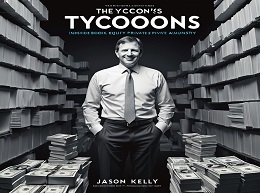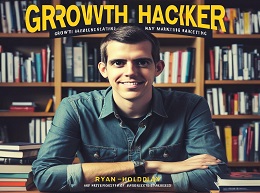The New Tycoons: Inside the Trillion Dollar Private Equity Industry That Owns Everything

The New Tycoons: A Deep Dive into the Private Equity Industry
In "The New Tycoons: Inside the Trillion Dollar Private Equity Industry That Owns Everything," Jason Kelly offers an illuminating exploration of the secretive yet immensely powerful world of private equity. As these financial juggernauts shape economies and influence markets globally, understanding their inner workings is essential. This review delves into the key concepts of Kelly's book, enriched with examples to engage readers and provide a thorough understanding of the private equity industry.
About the Author
Jason Kelly, an accomplished journalist and editor at Bloomberg, brings his extensive experience in financial reporting to this comprehensive examination of private equity. His access to industry insiders and meticulous research result in a narrative that is both informative and engaging, making "The New Tycoons" a must-read for anyone interested in finance, business, and the global economy.
The Structure of the Book
"The New Tycoons" is organized to take readers through the evolution, strategies, and impact of private equity. The book is divided into several key sections:
1. The Rise of Private Equity
2. Key Players in the Industry
3. Strategies for Success
4. Impact on Businesses and Economies
5. Future Trends and Challenges
Each section is rich with insights, detailed analysis, and compelling stories of the industry's major players and their transformative deals.
Historical Background
Kelly begins by tracing the roots of private equity, explaining how it emerged from the world of venture capital and leveraged buyouts in the late 20th century. This historical context sets the stage for understanding the industry's current scale and influence.
Example: The Kohlberg Kravis Roberts (KKR) LBO
One of the pivotal moments in the history of private equity was the 1988 leveraged buyout (LBO) of RJR Nabisco by KKR. This deal, worth $31 billion, captured public imagination and highlighted the potential and power of private equity, marking a significant milestone in the industry's evolution.
Growth and Expansion
Kelly outlines the factors that fueled the growth of private equity, including deregulation, the rise of institutional investors, and an increasing appetite for alternative investments. He explains how private equity firms capitalized on these trends to amass significant capital and expand their influence.
Example: Blackstone's IPO
Blackstone's 2007 initial public offering (IPO) is another landmark event. As one of the largest private equity firms, Blackstone's decision to go public showcased the maturity and mainstream acceptance of private equity, providing it with even greater access to capital.
Profiling the Titans
"The New Tycoons" offers detailed profiles of the industry's most influential figures, such as Stephen Schwarzman of Blackstone, Henry Kravis of KKR, and David Rubenstein of The Carlyle Group. Kelly provides insights into their backgrounds, business philosophies, and the deals that made them legends.
Example: Stephen Schwarzman
Schwarzman's strategic vision and relentless drive have been pivotal to Blackstone's success. Kelly discusses how Schwarzman's focus on diversification and risk management helped Blackstone navigate financial crises and emerge stronger.
The Role of Institutional Investors
Kelly also highlights the critical role played by institutional investors, such as pension funds, endowments, and sovereign wealth funds, in fueling the growth of private equity. Their search for higher returns in a low-interest-rate environment has led to increased allocations to private equity.
Example: CalPERS
The California Public Employees' Retirement System (CalPERS) is one of the largest pension funds in the world and a significant investor in private equity. Kelly explains how CalPERS' investments have not only provided it with substantial returns but also influenced private equity strategies and fund structures.
Leveraged Buyouts (LBOs)
One of the primary strategies employed by private equity firms is the leveraged buyout. Kelly explains the mechanics of LBOs, where firms use a combination of equity and significant amounts of borrowed money to acquire companies, improve their operations, and eventually sell them at a profit.
Example: The Hilton Hotels Deal
Blackstone's acquisition of Hilton Hotels in 2007 for $26 billion is a textbook example of a successful LBO. Despite the financial crisis, Blackstone's strategic improvements and effective management led to a highly profitable exit when Hilton went public in 2013.
Operational Improvements
Beyond financial engineering, private equity firms often drive value by improving the operational efficiency of their portfolio companies. Kelly explores how firms implement strategic changes, streamline operations, and enhance management practices to boost profitability.
Example: Bain Capital and Domino's Pizza
Bain Capital's investment in Domino's Pizza transformed the company through a focus on operational efficiency and marketing innovation. The revamp of Domino's menu and customer service strategy led to a significant turnaround, resulting in a successful IPO and strong market performance.
Exiting Investments
Kelly discusses various exit strategies used by private equity firms, including public offerings, sales to strategic buyers, and secondary buyouts. These exits are critical as they provide the returns that investors seek.
Example: The Carlyle Group and Booz Allen Hamilton
The Carlyle Group's exit from Booz Allen Hamilton involved a successful IPO in 2010. Carlyle's strategic guidance had strengthened Booz Allen's business, making it an attractive investment for public market investors and generating substantial returns for Carlyle.
Transformative Deals
Kelly provides numerous examples of how private equity deals have transformed companies and industries. He explores both the successes and controversies, offering a balanced view of the industry's impact.
Example: Toys "R" Us
The 2005 acquisition of Toys "R" Us by KKR, Bain Capital, and Vornado Realty Trust is examined in detail. While initially seen as a strategic move to revitalize the brand, the deal ultimately ended in bankruptcy, highlighting the risks and complexities involved in private equity investments.
Economic Influence
The book also discusses the broader economic impact of private equity, including job creation, innovation, and market efficiencies. Kelly argues that while private equity can drive significant positive change, it also poses risks such as increased debt levels and short-term focus.
Example: Private Equity in Healthcare
Kelly examines the role of private equity in the healthcare sector, where firms have invested in hospitals, clinics, and service providers. These investments have led to improvements in efficiency and care delivery but have also raised concerns about cost-cutting measures and patient care quality.
Emerging Markets
Kelly explores the growing interest of private equity firms in emerging markets, where economic growth and underdeveloped capital markets present new opportunities. He discusses the challenges and potential rewards of investing in these regions.
Example: Private Equity in India
Private equity investment in India has surged, driven by the country's economic growth and favorable demographics. Kelly highlights successful investments in sectors like technology, consumer goods, and infrastructure, which have yielded high returns for private equity investors.
Regulatory Environment
The evolving regulatory landscape is another key focus. Kelly examines how increased scrutiny and regulation are impacting private equity strategies and operations, emphasizing the need for firms to adapt to changing rules.
Example: Dodd-Frank Act
The Dodd-Frank Act introduced significant regulatory changes affecting private equity, including registration requirements and increased reporting obligations. Kelly discusses how firms have navigated these challenges and the ongoing debate over regulation's impact on the industry.
Practical Insights and Takeaways
"The New Tycoons" is rich with practical insights and actionable advice for anyone interested in private equity. Key takeaways include:
- Understand the Mechanics of LBOs : Leveraged buyouts are a fundamental strategy in private equity, involving significant financial engineering and operational improvements.
- Recognize the Importance of Institutional Investors : Pension funds and other institutional investors play a crucial role in the industry, providing essential capital and influencing strategies.
- Appreciate the Dual Nature of Impact : Private equity can drive transformative changes in businesses but also poses risks such as increased debt and short-termism.
- Stay Informed on Regulatory Changes : The evolving regulatory environment requires firms to be agile and proactive in compliance and strategy adjustments.
- Explore Emerging Markets : New opportunities in emerging markets can offer high returns, but also come with unique risks and challenges.
"The New Tycoons: Inside the Trillion Dollar Private Equity Industry That Owns Everything" by Jason Kelly offers a comprehensive and engaging look into the world of private equity. Kelly's detailed research, access to industry leaders, and balanced analysis make this book an invaluable resource for anyone interested in understanding the complexities and dynamics of private equity.
Whether you are a finance professional, an investor, or simply curious about the forces shaping our global economy, "The New Tycoons" provides the insights and knowledge needed to navigate the world of private equity. By exploring the strategies, successes, and challenges of the industry's key players, Kelly offers a nuanced perspective that both informs and inspires.
In a financial landscape where private equity continues to wield significant influence, understanding its inner workings is more important than ever. "The New Tycoons" not only sheds light on this powerful industry but also equips readers with the tools to appreciate its impact and potential.













